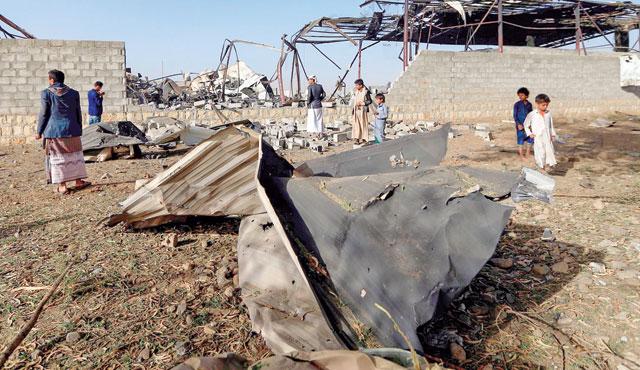You are here
Yemen's Houthis ignoring calls for political solution — Saudi minister
By Reuters - Apr 24,2019 - Last updated at Apr 24,2019
DUBAI — Saudi Arabia's deputy defence minister on Wednesday blamed Yemen's Houthi movement for a stalled peace deal in the main port of Hodeidah, saying the Iran-aligned group was ignoring the kingdom's call for a political solution to the four-year war.
Saudi Arabia is leading a Western-backed Sunni Muslim military coalition that intervened in Yemen in 2015 to restore the internationally recognised government of President Abed Rabbo Mansour Hadi, which was ousted from power in the capital Sanaa by the Houthis in late 2014.
"They are ignoring our calls for a political solution to this crisis," Prince Khalid Bin Salman said at a security conference in Moscow, in his first comments on Yemen since becoming deputy defence minister in February.
The warring parties reached a deal at UN-sponsored talks in Sweden in December for a ceasefire and troop withdrawal from the Red Sea port city of Hodeida, a lifeline for millions of people.
The Houthis say they are ready to implement the Hodeida deal, but that the other side is obstructing it.
The truce has largely held but the redeployment of forces has stalled with each side blaming the other for impeding the pact, the first major breakthrough in peace efforts in over four years aimed at paving the way for political negotiations.
Prince Khalid, a son of King Salman and a full younger brother of Crown Prince Mohammed Bin Salman, accused regional rival Iran of trying “to seize the Yemeni state” by supporting the Houthis, who control Hodeida and most urban centres in Yemen.
The Houthis deny being puppets of Iran and say their revolution is against corruption.
The conflict, which has killed tens of thousands of people and pushed the poorest Arabian Peninsula nation to the brink of famine, is largely seen in the region as a proxy war between Saudi Arabia and its arch foe Shiite Muslim Iran.
The Armed Conflict Location & Event Data Project, a database tracking violence in Yemen, last week said around 70,000 people have been reported killed since the start of 2016.
Western nations, some of which supply arms and intelligence to the alliance, have increased pressure on Saudi Arabia and the United Arab Emirates to end the conflict following the murder of Saudi journalist Jamal Khashoggi last October at the hands of Saudi agents at the kingdom’s Istanbul consulate.
Related Articles
ADEN — Yemen's foreign minister has submitted his resignation as differences emerge within the Saudi-backed government over the handling of
ADEN/SANAA — Saudi-led forces launched overnight air strikes on Yemen's capital, described by one resident on Sunday as the worst in a year,
DUBAI — Yemen’s Houthi forces have missiles that could be fired at Riyadh, Dubai and Abu Dhabi should violence escalate in the main&nbs












